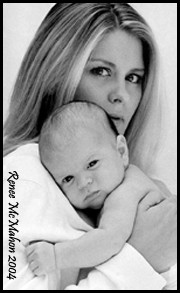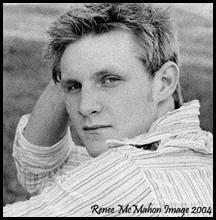The Artist as Entrepreneur |
Renee
McMahon
|
Renee McMahon is the second of ten children. She first lived in North Saint Louis County in the Normandy area. She attended Visitation Academy and went on to the University of Missouri in Columbia. She studied elementary special education, but even then gained some experience in photography. She had to complete two courses the summer of her graduation and was offered the opportunity to take a class in photography for teachers. She grabbed the chance. The next eight years or so, McMahon worked in the education field. She then joined her family's construction business, where she worked for twelve years. After meeting and marrying her husband, she decided to take her savings and try the photography business. McMahon and her husband found a 75-year-old home, which they have gutted and rehabed. She loves the nature of old homes, and she did the designing while her husband did much of the work. The following interview with Renee McMahon was conducted in her home by Cheryl Blake, UM-St. Louis, September 2004. Q. How did you get started in photography? A. I've actually had three or four careers. I was in education for eight years. Then I went into my family's construction business. It was stressful, and the hours were long. It was a secure job, but I knew I would go no further. Then I got married a few years ago, and my husband said I could quit if I wanted. I had taken photography classes on and off at junior college. Back at Mizzou, I had a class in photography for teachers. So when I decided to try working at photography, I went back to St. Louis Community College at Forest Park to relearn to process and print. They have some really good teachers. Q. Did your husband support your choice? A. Yes, and I had savings. I've only been at this [photography as a career] about three years. I'm lucky I didn't have to make a living right away. I used my 20 nieces and nephews as my first subjects.
And I'm
working with a woman developing a website. I have the ability to
scan my work, so I can update the site regularly.
Or my hairdresser, for instance, I took pictures of her family, and
she has some in her shop along with my cards.
Q. What about the photography itself: have you been learning as you go as well? A. Yes. I read a whole lot. And you have to shoot, shoot, shoot. I like natural light and about 90% of my work uses it. I'll go on location, take pictures here [at my home], use an outdoor setting like Forest Park.
I haven't gone digital yet. It's expensive and you have to keep upgrading. I want to use digital, but I don't think I can match my black and white quality yet. Q. Any advice for photographers starting out? A. If I had it to do all over again, I would start in photography. I would have taken that in college, along with business courses. It's hard to set prices. I went to a convention in January, and I learned that a photographer has to get over it--get over loving what we do so much that we put in lots of time without charging enough for the time. I think women do that in many fields. But you also have to consider that it takes longer at the beginning because you're new at it, so you don't want to charge too much. I'd advise someone starting out to work for a photographer first. They did the grunt work and know the resources and how to do the work. You can always find a niche. I like working with young moms right now. They don't need children to be so perfect. And I'll frame some prints, create a collage and arrange it on the wall. People buy what they see. I still look at all of them, all the photographs as I process them, and ask , "How can that be better?" copyright 2004, Center for Entrepreneurship and Economic Education, University of Missouri-St. Louis
|

